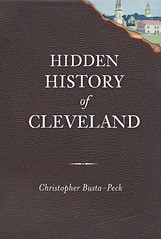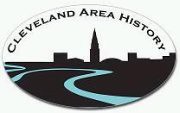Cleveland Area History: What exactly was it about Mr. Jingeling that made people love him so much?
Mike Olszewski: Mr. Jingeling meant a lot of things to young Clevelanders going back as far as the 1950s. First, when his five minute segments ran it meant that Christmas was on its way, and his stories usually involved a toy that was on sale that time of year. He was also included at the end of the Captain Penny show and at that time anyone on TV was a megastar. You waited to see Barnaby, Captain Penny, Woodrow the Woodsman, Franz the Toymaker and others when they made public appearances, but Mr. Jingeling was a lot more accessible. You could go downtown to Halle's and chances are he would be on the seventh floor! Keep in mind we had three TV stations back then, and the first TV generation embraced its heroes. Cleveland tended to accept really unique characters, usually in costume (like Ghoulardi), and their memories take us back to a simpler time. I remember the first time I saw Max Ellis in person as Mr. Jingeling I was amazed because he was in color. (Everybody watched him on TV in black and white.)
After a month of Mr. Jingeling segments WEWS would usually have a long-form Mr. Jingeling special and that was always an event. Also, those paper keys were status symbols. It showed you actually interacted with Mr. Jingeling and everyone had one.
CAH: Did you know any of the actors who played Mr. Jingeling? What were they like?
MO: I met Max Ellis as Mr. Jingeling and he was a smiling soft spoken character who made you feel important. He was an adult that spoke to kids like they were equals but also very special. I actually met Earl Keyes a number of times in and out of costume. In real life he was a very kind and funny man with a million stories about early TV at WEWS. But when he was Mr. Jingeling he was dramatic and had a real presence that filled the room. He would become possessed by the power and spirit of Christmas. What these men had in common was their ability to show us a reason to celebrate and offered us memories that would last forever.
CAH: Earl Keyes acquired the rights to the Mr. Jingeling character after Halle’s and Higbee’s went out of business. Do you think he felt personally responsible for keeping a local tradition alive? Or did he just like being in the spotlight and dressing up?
MO: There is no question that Earl Keyes loved the character and Christmas and it came up in just about every conversation I had with him. I firmly believe he wanted to call attention to the holiday season and the character. There was no Earl Keyes when he put on the costume. He truly became Mr. Jingeling. Remember that Keyes also produced TV segments for other Mr. Jingelings at WEWS. I do believe he thought it was an honor and duty to continue that character. I don't know what he was paid to do it, and frankly, I don't think he did either or if he even cared. Keyes loved Christmas, and kids loved Mr. Jingeling.
MO: There is no question that Earl Keyes loved the character and Christmas and it came up in just about every conversation I had with him. I firmly believe he wanted to call attention to the holiday season and the character. There was no Earl Keyes when he put on the costume. He truly became Mr. Jingeling. Remember that Keyes also produced TV segments for other Mr. Jingelings at WEWS. I do believe he thought it was an honor and duty to continue that character. I don't know what he was paid to do it, and frankly, I don't think he did either or if he even cared. Keyes loved Christmas, and kids loved Mr. Jingeling.
CAH: Sometimes children find supposed-to-be-lovable characters a little scary. Was this ever the case with Mr. Jingeling?
MO: I would guess some kids were scared of Mr. Jingeling, but they cry when they sit on Santa's lap, too. The thing was that you saw the same Mr. Jingeling on TV every night and then saw him in person. You were more in awe than fear. He looked weird, but so did Bozo the Clown, Ghoulardi, Barnaby and Woodrow and we all loved them.
CAH: Was there ever the kind of cynicism surrounding Mr. Jingeling that often surrounds other ad-based characters that “sell” to children, such as Ronald McDonald? For instance, was there ever the general feeling that we shouldn’t feel so sentimental about an advertising gimmick?
MO: I honestly do not recall anyone criticizing Mr. Jingeling for commercialization. Captain Penny plugged Bosco, Barnaby and Woodrow talked about products and on and on. Mr. Jingeling had toys but he also plugged Christmas and Cleveland....and you got a free key and a balloon when you went to see him!
CAH: People who are new to Cleveland, especially younger people, have never heard of Mr. Jingeling. Why should they know about him? How does knowing about Mr. Jingeling help Generation X/Y Clevelanders understand Baby Boomers a little better? Or is a Christmas elf really just a Christmas elf?
MO: Every city has its unique characters. New York had Officer Joe Bolton, Chicago had Garfield Goose and Bozo, Boston had Major Mudd and on and on. Those were the days when there was very little TV compared to today, and kids now have computers, cell phones, ipods, video games and other stuff to occupy them. But we were the lucky ones to grow up in the times we did! We look at Mr. Jingeling and the others the way Gen Xers would look at the Mario Brothers or Sid and Marty Krofft's creations. Lots of cities had kid show personalities. Cleveland just had the best. We always had the best! If you want to see what the baby boom was all about just look at its popular culture. Movies, comic books, radio, music and, of course, TV. That pretty much tells it all.




Really cool that you got this interview! Do you have any pictures/scans of memoribilia/YouTube clips to share? It would help younger readers and those of us who aren't natives get a better feel for what Mr. Jingeling was all about. In Search of Mr. Jingeling Part 3!
ReplyDeleteYou're on the money - stay tuned for Part Three, Cookbook!
ReplyDelete